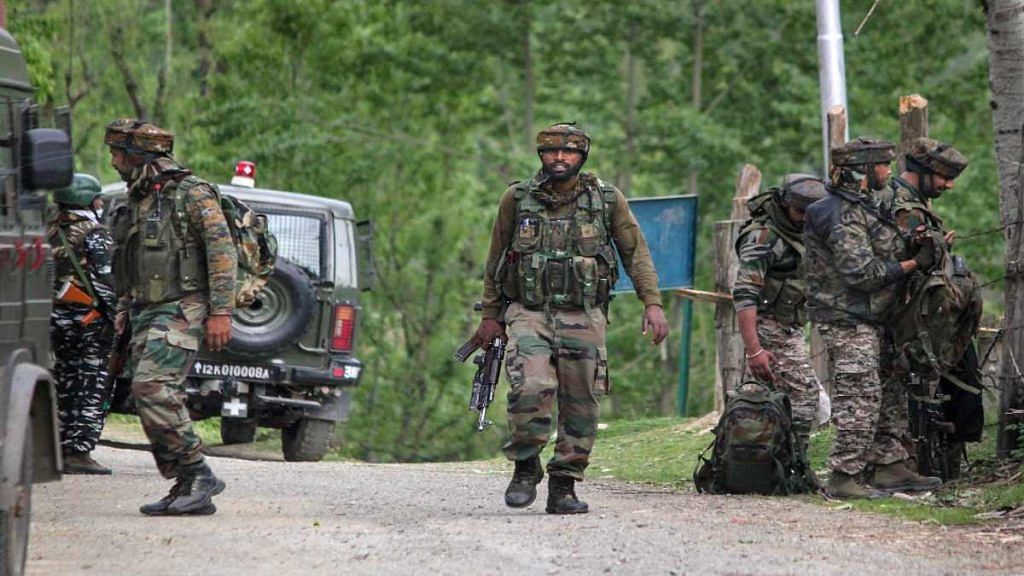Two hundred terrorists had been eliminated, summer posture for counter infiltration was in place,” writes Lt Gen H.S. Panag (Retd) in his new book The Indian Army: Reminiscences, Reforms & Romance, which also talks about his tenure in Kashmir.
But Lt Gen Panag is not a recently retired officer; he was the Northern Army Commander in 2007.
This is an indication that the annual ‘kill ratio’ of terrorists in Jammu and Kashmir, much touted both by the security forces and the government, is not a new phenomenon but has been happening for years. It is the same story every year, no matter who is in power.
It should be understood that counter-terrorism is not the Army’s main job and its heavy deployment in counter-terrorism operations actually leads to a “Kashmir-centric or Pakistan-centric thinking” of tactics and planning, which is harmful.
What is happening at the Line of Actual Control (LAC) is actually a blessing in disguise because we, as a country, have suddenly woken up to the real challenge – China.
Tackling this challenge would need a long-term change in the thinking process and the need to not bask in the glory of killing a few hundred terrorists every year.
Also read: Army not naming terrorists killed in encounters is a step back on its transparent culture
Important not to have a ‘kills’-driven mindset
It will be important not to continuously have a mindset driven by ‘kills’. The fact that terrorism continues to flourish despite the annual ‘kills’ is an indicator that this approach is not bearing the fruits. And yet, it is routinely used as a supporting element in official announcements.
In the run-up to the first anniversary of the Narendra Modi government’s decision to scrap Article 370, the Centre and the J&K security forces referred to the number of terrorists killed to highlight the move as a success.
There is no doubt that the task of the security forces in Jammu and Kashmir is to eliminate the terrorists who are waging Pakistan’s proxy war against India. But this single-minded focus of the forces and the government is rather counter-productive.
The forces are there for tactical reasons and it will be wrong to expect them to deliver the Kashmir solution.
The fact that the kill numbers showed a sharp rise in the run-up to the anniversary is very disturbing, especially since most of the kills were of local youngsters who had joined the terror groups in the recent past.
Incidentally, unlike earlier, these youngsters are neither trained nor heavily armed. No wonder that a lot of pistols were recovered from recent encounters.
I have, in the past, argued against the whole new policy of security forces to not identify the terrorists killed.
There is already a storm brewing in Kashmir over the killing of three ‘militants’ in an alleged encounter in Shopian in July. There are reports that suggest the three could be innocent labourers from Rajouri, Jammu.
Only a sincere probe can reveal the facts about the ‘Shopian encounter’ but there is an eerie reluctance among the security forces, with even the local police being cautious and not playing the ball on the details about the encounter.
Also read: Missing Rajouri youth bought salt & chilli, did up house, then ‘disappeared’ into the night
Not words but action will bring “new paradise”
In September 2019, Prime Minister Narendra Modi had called for “hugging each Kashmiri” and creating a “new paradise” in the Valley.
It is time for the Modi government to walk the talk when it comes to Kashmir. The high kills will give the government headlines in the media, but if it genuinely wants to leave behind a legacy and solve the Kashmir issue, it will have to work on the ground for the “new paradise”.
Looking at Kashmir through the prism of security will not resolve the issue. It is a welcome change that the Modi government has now appointed a new Lieutenant Governor, BJP leader Manoj Sinha, for the Union Territory, who is a true-blue politician. It is by now sufficiently clear that Kashmir cannot be managed by the bureaucracy.
Another important thing that the Modi government needs to do is sensitise the news channels and make them aware of the harm that they cause with their endless high-pitched debates that consistently paint the Kashmiris as villains.
And this has been a serious concern even among the security officials who are genuinely working to change the situation on the ground.
The Centre’s former Special Representative on Jammu and Kashmir, Dineshwar Sharma, had in 2018 said that “vicious propaganda” against Kashmiris by some TV channels was affecting the peace process.
And there is no doubt over this. I have personally felt this during my numerous trips to Kashmir and interaction with locals.
Along with the TV channels, the rabid radicals in Kashmir need to be tacked with. The government did good by cracking down on the terror financiers and backroom boys but this seems to have lost its steam.
The crackdown needs to be consistent and the civil administration must play a huge role in kickstarting new development projects and bringing change on the ground because only then can Kashmiris truly see the benefits.
While the government does its bid, the local people in Kashmir also need to know that their future is tied with that of India. Any dreams of being an independent state is just a dream and nothing else. Neither is India going to part with Kashmir nor is Pakistan going to let Kashmir remain independent.
Views are personal.
